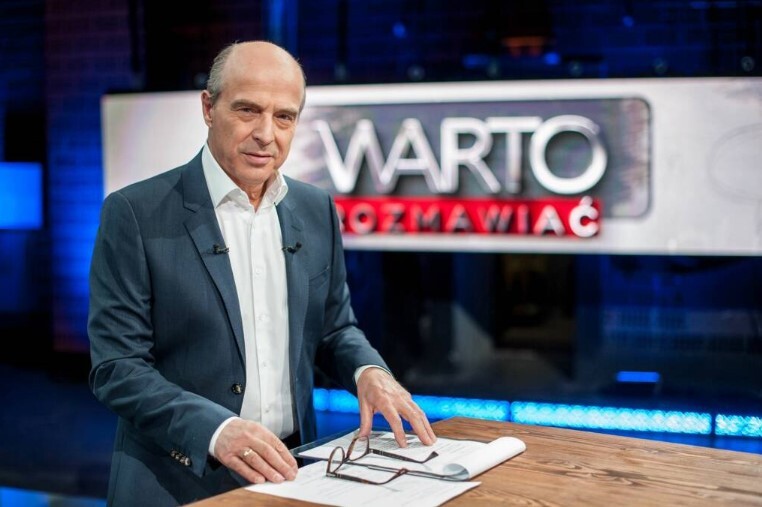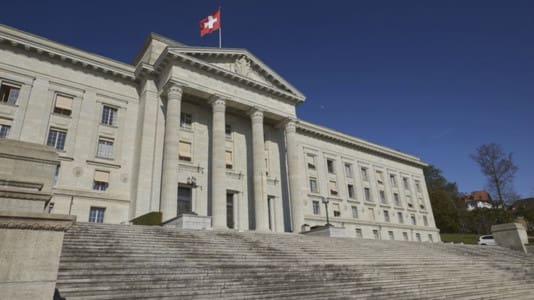You must have seen what was going on at the headquarters of the public television broadcaster TVP on Woronicza Street in Warsaw these days. You probably know the place well since for many years you ran a show for TVP, which was very popular in Poland. What are your impressions?
I experienced a lot of things at TVP. I saw many CEOs being replaced. I also remember various more or less turbulent changes among directors.
But I had never seen such jostling and pushing, with some outside people coming to forcibly lead people out of their offices, slamming and locking doors, jumping over people, pushing MPs. Frankly, I had never seen such a use of force there.
I started working at TVP in 1994. We were a new team, and we were not welcome there either. The post-communist establishment, to which the television personnel mostly belonged back then, treated us as a foreign body. But even those communists behaved much more decently towards us than what we see today on those cell phone video recordings in Warsaw.
Which side do you think is to blame for these astonishing scenes? Those who don’t want to hand public television to the new government’s appointees? Or is it more about the way public television is being taken control of that is different from the usual practice?
The forceful takeover of public television is an admission on the part of the new Culture Minister Bartlomiej Sienkiewicz and his bosses, i.e., Donald Tusk or someone even higher, that they know they are not following the law. If, in terms of formal procedures, there had been a legitimate change of the management at TVP, the Polish Press Agency, and Polish Radio, then the previous team would have left just as the politicians from the Law and Justice coalition had left their offices.
After all, ministries and the parliament building did not have to be taken over by force with the help of some thugs — those weird big men in hoods. The Morawiecki government’s ministers just left their offices and moved out. They handed over drawers, desks, and documents to their successors because these successors had been chosen in a democratic election procedure by the people.
Similarly, there are legal regulations provided for how the changes in public media management staff take place. There is the National Media Council, there is the National Broadcasting Council, there are the boards of directors of these media, and they appoint the CEOs of the public media companies. This is stipulated by law, and we have regulations for this, which allow for a smooth transfer of power and make it possible to replace the persons concerned.
It’s just that Minister Sienkiewicz and his team, his bosses, and his political friends knew well that they were not following procedures, and that they were breaking the law. So, they knew they would have to carry out the culture minister’s decision by force. Hence the presence of weird bodyguards, some sort of muscular assailants, to enforce that decision.
For God’s sake, by acting like this they have themselves admitted that they are taking shortcuts, that they are not pushing things to the limits but way beyond the limits, hence the need to use fists.
They say they have to do so because public media must be depoliticized. You happen to be in such a situation that you were censored by public television both under the previous governments of Donald Tusk and under Mateusz Morawiecki. What comes to your mind when you hear from one political camp that they want to depoliticize television and from the other camp that they want to defend its independence?
This kind of feigning is ridiculous and this story about depoliticizing the media or making their coverage objective is one big hoax. I don’t know if anyone will be fooled into thinking that these new faces, such as the new CEO of TVP Tomasz Sygut, are apolitical journalists or officials.
In my life, I have been, if I counted correctly, expelled from public television as many as 11 times. The first time I was sacked was in 1997 by the CEO of TVP, who was then from the agrarian party PSL [a member of Tusk’s current governing coalition, ed.]. He threw out our program, which dealt with popular culture. So, the agrarian party’s nominee threw out what was probably the first program in the history of Polish television that talked about folk culture, folk traditions, and folk music in a reliable and sensitive way.
Later, when we settled for good at TVP in 2004 with our show Warto Rozmawiać (“It Is Worth Talking”), there was another change in the CEO of TVP. I have worked under many CEOs there. Many times our program was taken off the air. These were not some spectacular sackings, but simply the end of a contract. It was expiring and no place was found for us in the new TV season. We were removed with an iron fist in a velvet glove, one might say.
Nevertheless, we managed to function for many years on different channels. They often tried to take us out by starvation, lowering our fees and offering humiliatingly low wages, but we knew we had a mission. It was important for us to keep going even under these difficult circumstances, even being pushed aside. There was a time when our shows appeared at 11:40 p.m., which is a time for people suffering from insomnia or third-shift workers.
However, we survived, and I have the impression that we managed to produce quite a few valuable programs.
Until the “It is Worth Talking” show was definitely taken off the air…
In 2021, the Law and Justice (PiS) party came to the conclusion that it was not worth talking and, with the hands of TVP CEO Jacek Kurski, kicked us out of television. Since then, no one has ever invited me to appear on TVP again, although many times before I was invited as a columnist, as some kind of expert, or as a commentator on political or social life, especially for talk shows.
It turned out that for the authorities of the time for TVP, CEO Jacek Kurski and Prime Minister Mateusz Morawiecki — because somehow I think Morawiecki was behind what happened to us — I was to be treated like a leper, as anathema, and I should be completely banned and censored.
This censorship, by the way, was to the point of even blocking access to our archived episodes on VOD platforms. I consider this pure meanness, because the owner of this material, of these resources, is neither Morawiecki nor that bearded TVP CEO who later replaced Kurski, Mateusz Matyszkowicz. It is owned by public television and the public, who with their taxes, with 2-billion-zloty subsidies, have kept the business going.
On these recordings, which are no longer available, there were many victims of the Smolensk air disaster with valuable comments. Many great people appeared with us, and perhaps this gave them a presence in the public space, with a unique message, which is already part of history.
Having done that show since 2004, we had several hundred broadcasts recorded live over the course of 17 years. Some were better, others worse, but we had people like Italian politician Rocco Buttiglione and Chechen oppositionist Akhmed Zakayev as well as many other outstanding people. We did the only Polish TV interview with Viktor Orbán in 2011, that is, when the European Union was putting the screws on him and accusing him of some of the most horrible things, the moment he started cracking down on Soros and his foundations in Hungary.
Also, in my opinion, these shows had their value, whether one likes the presenter, myself, or not. They were something special and they were blocked to the general public. And this was done by the Law and Justice appointee at TVP, which is really extraordinary.
So public television in Poland does need fixing, right?
Yes, but observing what Donald Tusk is doing today, this is something wicked, and paradoxically, although the person who started the campaign against our TV show and set in motion the mechanism for kicking us out of television was Joanna Lichocka, I will today defend Joanna Lichocka, her presence in the National Media Council and the functioning of the National Media Council [which, under a law passed in 2016, is the authority in charge of appointing and dismissing the CEOs of public media in Poland, ed.].
This authority was established in accordance with the law and functions under the law. Ignoring the National Media Council, ignoring the National Broadcasting Council, and having some sort of boxers called in to take over TVP is a scandal. It is not only destroying the public media, but it is destroying Polish democracy and the Polish legal order.
On the other hand, there is no doubt that public television needed reform, with a huge amount of work lying ahead to really try to save this media outlet for the good of the general public. I, for one, did not watch political talk shows or the news on TVP, but not because I was traumatized by having been thrown out. I did not watch because with my sensibilities and my need to have a sense of meaning, it was just impossible to watch.
But a lot of valuable material was produced alongside this, even if it was not often in prime time. There have been many valuable documentaries and reports produced on television during the PiS era alongside this unfortunate highly asymmetrical political news coverage.
In terms of news and journalism, things were definitely better on Polskie Radio (Polish Radio), the public radio group in Poland. There was less of this kind of aggressive propaganda, more factual journalism, more diverse guests, and great shows by journalists and commentators, which I listened to with great interest.
You are now talking about this so-called “PiS television,” i.e., TVP under the rule of the Law and Justice party, but as I remember after 2010-2011, when Donald Tusk and his Civic Platform (PO) were in government in coalition with the PSL party, for a couple of years you were basically the only journalist and commentator with conservative, right-wing views allowed on public television. In the early 2010s, Donald Tusk’s government conducted a major purge of the public media after taking control of the National Broadcasting Council. But even then, between 2010 and 2015, your show was taken off air several times and only returned under pressure from viewers, albeit late at night.
Indeed, public television at that time was also impossible to watch, just as it was later under PiS. Its journalists were good at their job, but they were nevertheless people who were completely on one side of the ideological divide, which they did not even hide. This manifested itself in the selection of guests, scripts, news reports, a hugely biased, anti-patriotic narrative, and a failure to carry out the public mission.
After all, despite all the propaganda on public television under PiS, some fairly sensible programs have been produced in the last eight years. Admittedly, there has also been negligence regarding culture and education on the part of the TVP management for the past eight years. They did not take up so many valuable things that people asked for. A good example of this is the story surrounding the affirmation of children’s constitutional right to life for those children diagnosed with prenatal disabilities. Confirmation of their right to life by the Polish Constitutional Tribunal in 2020 was not properly covered by public television.
I know how pro-family organizations and various foundations dedicated to protecting life and caring for the family came to TVP with proposals for regular programs or some kind of social campaign long before this ruling. All of them were thrown out on a whim. No one has taken up the subject. Public television in general did not give a damn about carrying out such a mission.
And under Donald Tusk?
Under Donald Tusk, it was altogether impossible. Even historical films were not welcome. I remember that the film “Days of Honor” — one that was strongly patriotic and showed the struggle of the Polish underground during WWII German occupation — was sponsored or partly financed by a commercial entity because TVP showed reluctance to support this project.
Also, observing the mission of public television, this social mission — the mission to protect the most important values, such as the family, demographics, and respect for the state — was not implemented at all under Tusk. PiS took up the issue but did it in a flawed and highly questionable manner from a qualitative point of view.
However, until now, public media CEOs and managers were appointed in accordance with the law. Today, the law has been brutally violated. Additionally, under the Law and Justice government, even if I didn’t like this flawed public television, thanks to it, two visions of the world were presented on TV.
You could watch TVN [a private television group that presents liberal views and is overtly hostile to PiS, ed.] to see what’s going on in the world, and then see what TVP says about it. And at least there were two different voices in the media.
Western media and the elites in Brussels reproached Poland precisely for its lack of pluralism
In recent days, I have been trying to find out from my friends in France how Michèle Rivasi, a well-known MEP of the French Greens, died. She pushed hard for Ursula von der Leyen’s contracts with Pfizer to be revealed. She served on this European Parliament committee, which sought to clarify and reveal the European Union’s secret contract with Pfizer. For example, why did Ursula von Leyen buy 4.5 billion vaccines for less than 450 million citizens of the European Union, which gives 10 doses each for everyone including infants?
Ms. Rivasi asked such uncomfortable questions, and suddenly it turned out that she died on November 29. I was trying to find out if she had complained of any health problems before and if anyone is interested in this topic in France. Do we know anything more about the person who threw down the gauntlet to the most powerful forces in Europe, like the head of the European Commission and Pfizer, one of the most powerful global companies?
We know nothing. The French media are completely silent on this. And when I asked my French friends what the opposition media in their country were writing, they just laughed: “What opposition media? In France, on these issues, all the media speak with one voice.”
In this regard, complaining that there is no objectivity on television in Poland is nothing original, as I have seen programs on the BBC about Polish anti-Semites, about the Black Sotnia, about the 70,000 fascists who walk the streets of Warsaw and want to murder Jews and homosexuals. Such things were aired on the supposedly objective BBC with complete disregard for reality.
Looking for objectivity in the media is like looking for virginity in a brothel. In contrast, during the eight years of PiS rule, at least we had two different voices in the Polish media. This situation was far from perfect, one could sometimes disagree with both sides, but at least we were learning about some of the things that the European Commission was preparing, for example.
Of course, you would never hear on TV about how harmful COVID vaccines are. On the issue of the COVID scam, all TV stations speak with one voice. On the other hand, one could learn more about a couple of issues such as the threat of immigrants, or what was happening on the eastern Polish border when there was Lukashenko and Putin’s hybrid attack with waves of migrants from the Middle East and Africa.
Here in Poland, there were at least two different voices. Now, we won’t even have that.
Jan Pospieszalski is a well-known right-wing conservative journalist and commentator in Poland. From 2004 to 2021, he produced and presented a popular talk show on public television, “Warto Rozmawiać” (“It is Worth Talking”). Because of the views presented on his show, it was taken off air several times under the first two governments of Donald Tusk, in the years 2010-2015, and ultimately, in 2021, under the government of Mateusz Morawiecki.






